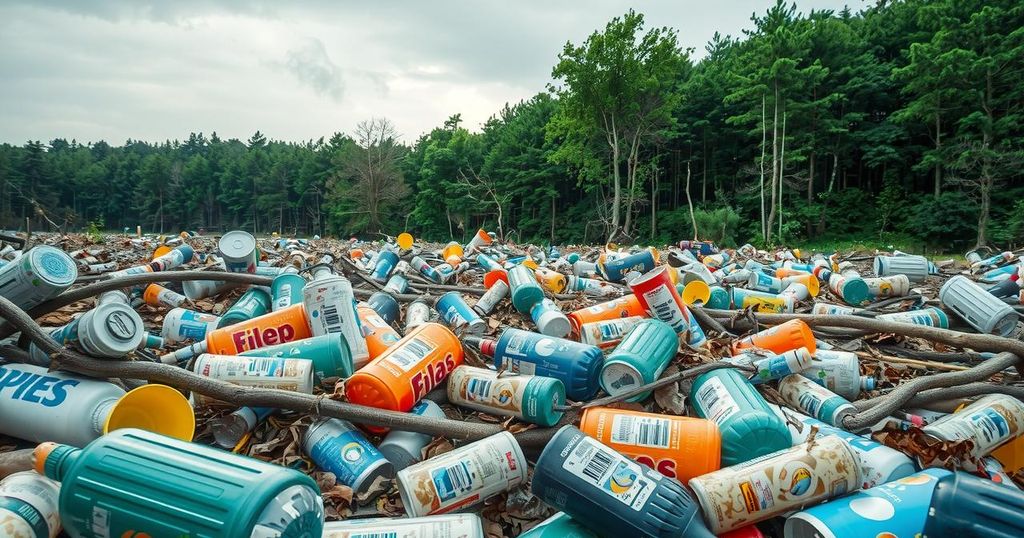Zimbabwe’s Struggle Against Illegal Chinese Plastics and Environmental Crisis

Zimbabwe is facing a significant environmental crisis due to illegal plastic imports, mainly from China. Despite existing regulations banning thinner plastic bags, many vendors and manufacturers continue to produce and sell non-compliant products driven by demand and lower costs. This situation contributes to severe pollution and environmental degradation, as proper enforcement of regulations remains a challenge amidst economic dependency on Chinese investments.
At Mbare marketplace, a significant trading hub in Zimbabwe, the prevalence of plastic bags is alarming. These bags, often imported from China or sold by local Chinese enterprises, fail to adhere to Zimbabwe’s legal standards for plastic packaging. Local vendor Tichaona confesses that while he acknowledges these plastics are forbidden, he continues to sell them due to their affordability and high demand among customers.
Many consumers remain unaware that the plastic bags they purchase are often thinner than the legal limit. An employee at Colour Maximal, a Chinese plastic manufacturing company in Harare, remarked anonymously, “We know what the quality should be, but we never produce it. Customers are told these plastics meet the 30-micron requirement, but that’s simply not true.”
Zimbabwean regulations prohibit the production and sale of plastic packaging thinner than 30 microns, except for specific bread packaging. Nevertheless, the country faces a surge in cheap plastic imports from China and an increase in domestic manufacturing by Chinese firms. This situation highlights a significant loophole, contributing to an escalating pollution crisis.
Veteran industry worker Donald Marumbwe asserted that these importers disregard quality in favor of cheaper alternatives, stating, “[They] don’t care about quality. Their products are cheaper. People can just walk in and buy in bulk.” Global Press Journal’s independent tests revealed all samples from Colour Maximal were below the required thickness, with some bags measuring merely 20 microns.
Furthermore, samples from bread packaging obtained within Mbare marketplace displayed alarming measurements, with instances as thin as 6 microns. Thin plastic bags, primarily used for single purposes, can take millennia to decompose, disintegrating into harmful microplastics that pose risks to wildlife and human health, whereas thicker options are more likely to be reused and recycled.
Tatenda Murwira, a manager at Colour Maximal, admits that cost efficiency drives the production of these thin plastics, noting, “We’re profit-oriented. It’s all about saving materials and keeping prices competitive.” Resultantly, Zimbabweans bear the brunt of the environmental impact, as improper disposal of plastic waste contributes to approximately 18% of the country’s total waste.
This waste clogs waterways, litters urban spaces, and correlates with severe flash floods and animal fatalities; an alarming count of 5,000 animal deaths has been attributed to plastic pollution since 2010. Chef Amkela Sidange from Zimbabwe’s Environmental Management Agency indicates that inspections are regularly conducted to enforce compliance, though many violators evade scrutiny.
Murwira claims that while environmental officials have visited his company, they have never conducted an actual factory inspection. The lack of manufacturer identification on plastic packaging complicates efforts to control the source of these illegal products, as none of the bags analyzed at Mbare bore identifiable brand names.
Zimbabwe’s reliance on Chinese imports has escalated dramatically, with figures rising from $10.9 million in 2012 to $54.8 million in 2023. Former President Robert Mugabe’s policies facilitated strong ties with China, leading to increased Chinese investments across various sectors, fostering growth while simultaneously resulting in severe environmental challenges.
Professor Gift Mugano asserts that the relationship between local authorities and Chinese firms enables these companies to operate outside strict environmental regulations. He criticizes this collaboration as a facet of modern neo-colonialism, illustrating how economic dependency complicates enforcement of environmental laws in Zimbabwe.
Despite attempts such as imposing a 20% tax on plastic bags in January to mitigate the crisis, enforcement remains weak, with many companies evading taxes as they do regulations. Murwira argues for his company’s compliance in tax obligations, yet an expired tax clearance certificate highlighted during a Global Press Journal visit raises concerns over adherence to legal standards within the industry.
The analysis of multiple firms, including those posing as Multiple Star, revealed widespread noncompliance regarding plastic thickness. Without strict enforcement and public awareness initiatives, Zimbabwe’s fight against illegal Chinese plastics may continue to falter, posing ongoing threats to the environment and public health.
Zimbabwe is grappling with a severe environmental crisis stemming from illegal imports of substandard plastic bags, primarily sourced from China. Although regulations exist, enforcement is weak, and economic dependence on Chinese investments complicates compliance. The prevalence of cheap, non-compliant plastics not only undermines local industry but also exacerbates pollution, significantly impacting wildlife and human health. Immediate action and stricter regulations are necessary to curb this growing crisis.
Original Source: www.newsday.co.zw







